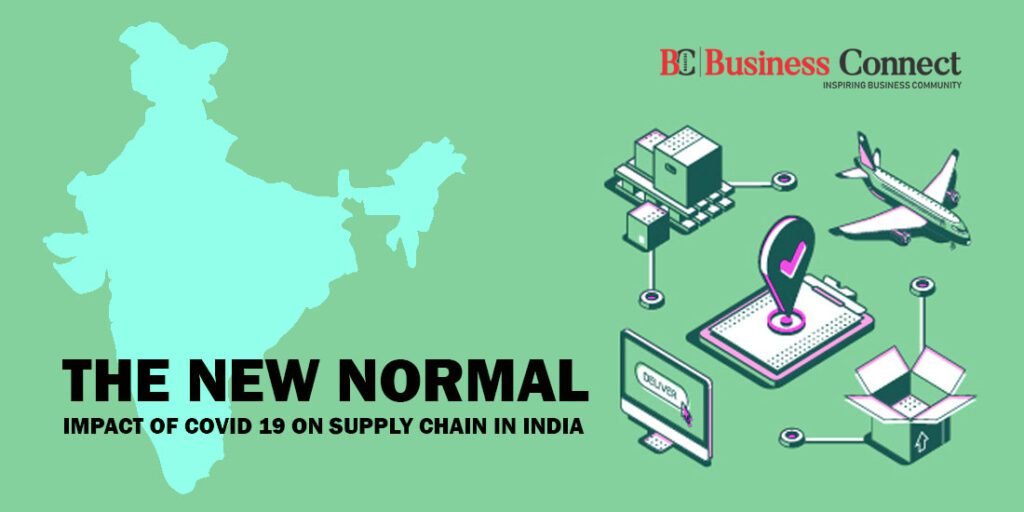THE NEW NORMAL – IMPACT OF COVID 19 ON SUPPLY CHAIN IN INDIA
With each day passing by, what has become the most crucial topic of discussion among the leaders of SCM is – Could COVID 19 turn out to the black swan event? Could it or has it become so impactful that it could lead companies and industries to transform their existing supply chain models? The impact of this pandemic, which has been termed as the ‘disease X’ by epidemiologists has been devastating as it was totally an unprecedented event. As the world tussles with economic crises, the supply chains are combating their own unique fights to overcome the crises.
China is the ‘World’s Factory’, the impact of this pandemic on the supply chain has been virulent. According to the reports from Dun & Bradstreet, on a global level, 51,000 companies have one or more direct or Tier 1 suppliers from China and an additional five million companies have Tier 2 suppliers there, with 938 of those being Fortune 1000 companies.
Even before the pandemic, due to the major disruption in trade flow in the recent times, most of the companies were giving emphasis upon making the supply chain leaner in terms of minimizing the cost, minimizing the waste generated, and minimizing the delay in delivery time. This led to insufficient inventory buffers during the time of this outbreak.
India, just like other countries has been dependent on Chinese imports. There are certain industries that have faced massive consequences due to this dependency. They are-
● Pharmaceuticals as China supplies 70% of active pharmaceutical ingredients (API) required for the industry.
● Automobile Industry as approximately 10-30% of the raw materials is imported from China.
● The renewable energy sector as 80% of the required solar panels is imported from China.
● Various Chemical and Textile industries.
● Several MSMEs are dependent on Chinese imports.
The outbreak of COVID 19 came as a great shock as well as a learning lesson for the companies particularly in India; some lessons include –
● Implementing lean supply chain strategies though can increase profitability on a short term basis, it can lead to insufficient inventory buffer in the long run which can lead to disruption in the supply chain.
● Depending upon only one country as a source of supply is never a great idea, rather companies should engage themselves to find multiple sources of supply especially for the essential commodities.
● The need for the hour is to increase investments in Indian local industries which can act as a shot in the arm in the time of the crises.
According to a report by Mckinsey, consumer survey shows an increase in expenditure on grocery items and a decrease in spending on discretionary items. With the change in consumer demand, experts have put forward various ways to tackle the current situation. Some of them are-
● Suppliers – Due to the sudden increase in the demand for essential commodities, retailers are facing a network-wide shortage. Businesses should engage themselves in diversifying sources of supply. Having unified stock visibility across all the channels of the supply chain in a single database is crucial. Visibility in stock movement across the supply chain network can lead to mitigate delays and accelerate the outcomes.
● Manage demand volatility- In the short term, halting promotions, prioritizing products, and creating inventory buffers are strategies to help manage demand when supply is limited.
● Distribution-In the supply chain, distribution is where demand trends for non-essential and essential commodities start to overlap significantly. Cross-training programs to cope up with the current scenario should be arranged for the workers. There should be rearrangements and reassignments of works i.e. a temporary shift from office works to distribution centers. The Health and Safety of the employees should be given the utmost priority while engaging them in work.
• Logistics-Flexibility in logistics comes into role in such situations. The shipping process is to be simplified. The goods to be shipped directly to the stores without going through the distribution centers to increase the efficiency of timely distribution. However, this could lead to an increase in the cost of the shipment process. This can be mitigated by placing a number of warehouses in different locations so that the shipping cost can be controlled to a certain extent by delivering the items from a nearby location. Transparency in the delivery process is of utmost importance. Transform the raw data into actionable insights that can be shared with all relevant stakeholders across the value chain in a timely manner.
The supply chain becomes a company’s biggest risk during times of disruption. But by making it antifragile & resilient it can become its biggest strength & assure it combats future shocks. Now it has become the moment for supply chains to innovate and contribute; just like one company resolved the shortage of ventilators in Italy by using 3D printing and making them available within a day. They should be able to deal with demand fluctuations and macroeconomic instability. It is the time when artificial intelligence and process automation comes into play.
For example, systems that provide low-stock alerts can automatically order goods for a particular store quickly and cost-effectively from the right location by using work automation. With the use of Artificial Intelligence, combining all the data collected, applications can work on scenario analysis and ‘what-if’ conditions- creating a complex model to handle such unprecedented situations.
It is the time to adapt because this is nothing but THE NEW NORMAL.
About the Author
A student of MD-M, formerly worked with Shapoorji Pallonji for 2.5 years, Monalisa Borah has a deep interest in pursuing her career in Operations and Supply Chain Management. In addition to her professional career, she is a Visharad in Indian Classical Dance form- Sattriya Nrittya and also a CCRT Scholarship holder under the ministry of Culture, Government of India.



